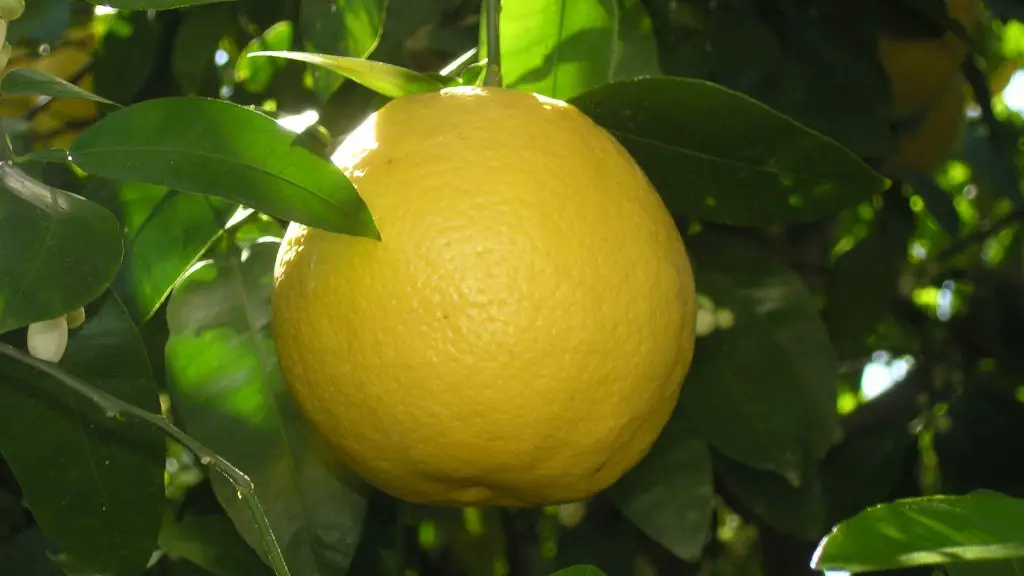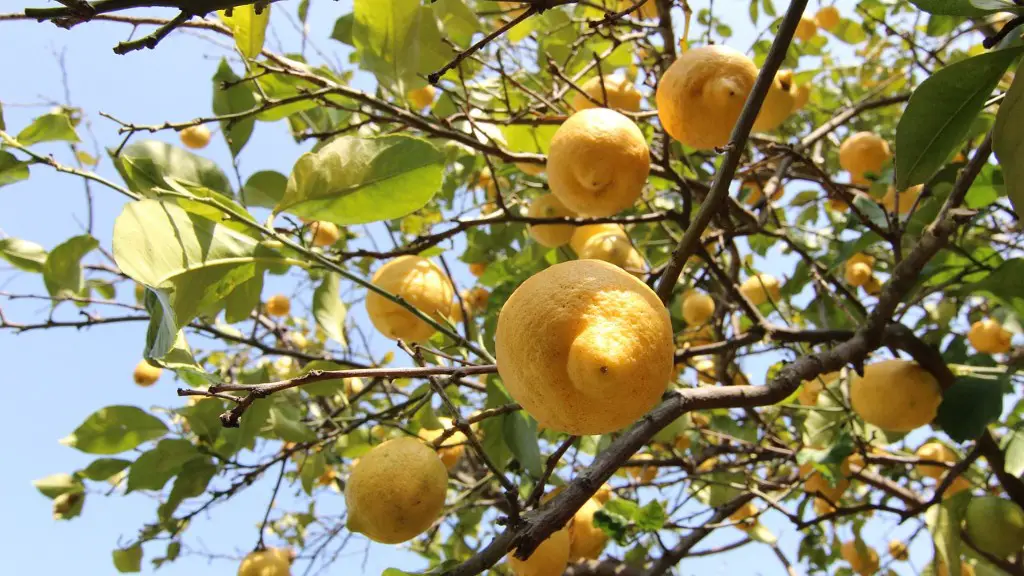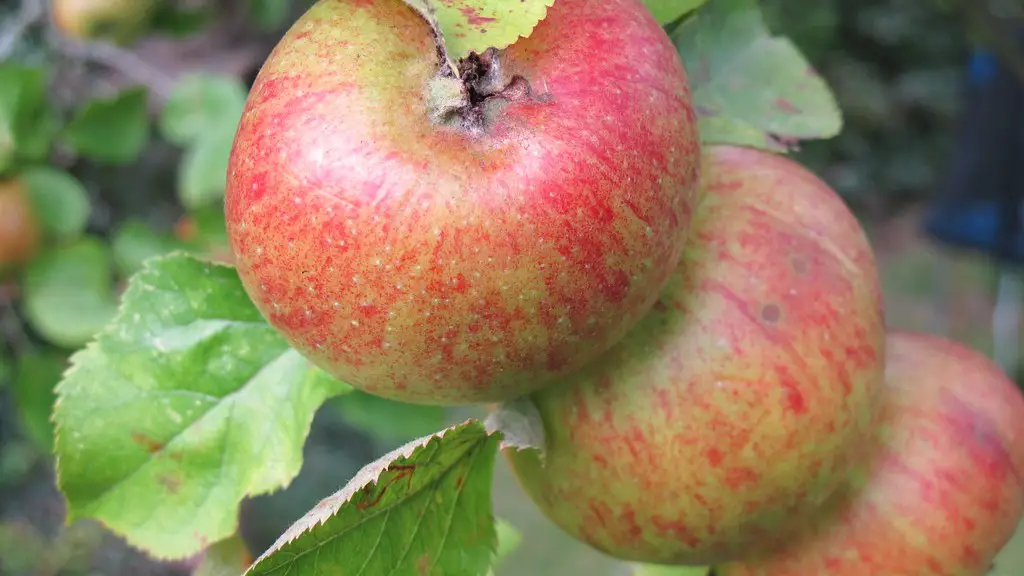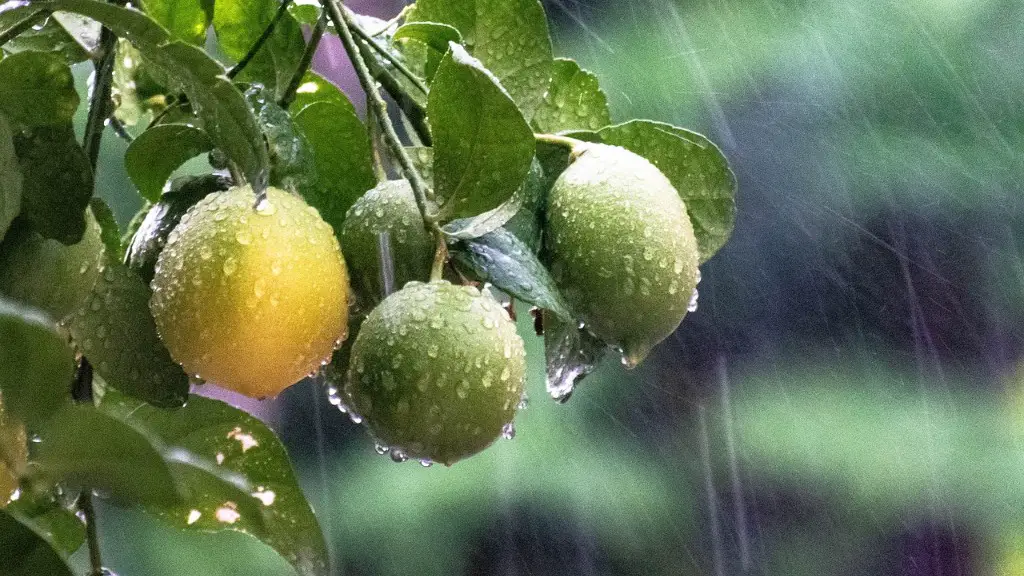How Much Water does a Lemon Tree Need?
It is crucial to understand the exact water needs of a lemon tree, particularly when it is planted in an arid climate, to ensure a healthy and productive growth. Lemon trees located in drier, arid conditions need a solid irrigation schedule and attentive care to supply them with enough water to properly thrive. Knowing how much water to give is essential for a productive and healthy tree.
A lemon tree requires regular and frequent irrigation during the dry season, when it is still in the juvenile state. During the wet months, water must be supplied at least once a week, but this amount may depend on the humidity and other environmental factors. Once the tree matures, it needs less water and can, eventually, be planted in a location where it can withstand drier conditions.
Like most other plants, a lemon tree’s water needs depend on its age, soil type, and weather conditions. The important aspect to consider is the tree’s water needs during the dry season. During the first two years, a lemon tree needs approximately 1.5 to 2 gallons of water per week. After it matures, 2 to 3 gallons of water per month should be sufficient.
When watering a lemon tree, it is important to be thorough. Don’t water a little and move on. Standard sprinklers can be used, but the water should be deeply applied to reach the entire root structure of the tree. This helps to discourage shallow and stressed root systems. Registered soil moisture management can also be used to help water the trees correctly and systematically.
Mulching is also an effective way to help retain soil moisture. Adequate mulching supplies help the lemon tree to retain relatively large amounts of water and prevent weeds, which competes for essential water and other essential nutrients. Straw, grass clippings, and other types of organic materials are some of the best sources of mulch, which should be laid around the tree with a 2-3 inch thick uniform layer.
In conclusion, since environmental conditions and soil types can influence how frequently a lemon tree should be watered, there is no one-size-fits-all answer. A reliable irrigation schedule based on the tree’s age, soil type, and environment can help ensure a healthy and productive lemon tree.
How to Maintain Sufficient Soil Moisture for a Lemon Tree
Sufficient soil moisture is essential for a healthy lemon tree. Excessive water can cause root rot whereas a lack of water can reduce root uptake and ultimately lead to a tree’s decline. Irregular and inconsistent water intervals should be monitored and addressed to maintain a lemon tree’s health. Properly monitoring and measuring soil moisture can help maintain suitable soil moisture levels.
One of the most effective ways to test soil moisture is to use a soil moisture meter. This device is placed into the soil and used to measure the amount of water in the soil. When the meter indicates that the soil moisture is too low, the soil can be irrigated accordingly.
Regular applications of a soluble fertilizer can also help maintain sufficient soil moisture for a lemon tree. By providing several feedings per year, ample nutrients are maintained and water absorption is promoted. This helps to reduce soil compaction, promote deep root systems and fortify a lemon tree’s growth.
It’s also important to make sure the soil is not compacted and has adequate drainage. Soil aerification such as double digging and composting can help loosen and improve soil quality. This helps with water absorption and aeration as well as encourages active microbial activity.
In addition to soil aerification, adding a thick layer of mulch can also help improve drainage, air circulation and minimize water loss. Good quality mulches, such as straw, help the soil retain moisture and provide essential nutrients. Properly applied mulch also helps regulate soil temperature, which ensures a healthy and vigorous growth.
Overall, appropriately measuring and monitoring soil moisture is an essential part of lemon tree care. With a committed irrigation schedule and proper soil maintenance, a healthy and productive lemon tree can be grown and enjoyed for many years to come.
Factors Influencing Lemon Tree Watering Requirements
Water is essential for lemon tree growth and development, but it is important to remember that a lemon tree needs only limited amounts of water. Excessive water can cause root rot and other problems, but an overly dry soil can also be detrimental to a lemon tree’s health. Thus, understanding the irrigation needs of a lemon tree is critical to productive and healthy tree growth.
A wide range of environmental factors influence watering needs, such as temperature, soil type, and amount of sunlight. In general, lemon trees planted in warmer climates will be more prone to water stress and require more frequent irrigation, while trees in cooler areas may need less water. Appropriately measuring and monitoring these factors is essential to understand how much and how often a lemon tree needs water.
In addition to environmental factors, the type and quality of soil can also influence a lemon tree’s irrigation needs. Lemon trees need well-draining soils; and soils with a high organic matter content, such as compost and sphagnum, help keep the soil from drying out. Typically, lighter soils and soils with a lower organic matter content may require additional watering.
Finally, the age of the tree must also be taken into consideration when assessing water needs. A juvenile lemon tree will need more frequent waterings than mature trees. Baby trees are still in the growing phase and require a lot of water, whereas adult trees may need only occasional and minimal irrigation.
In summary, a precise understanding of the factors that can influence a lemon tree’s water needs is essential for a healthy and productive tree. Temperature, soil type and tree age are all important considerations when assessing the proper irrigation needs of a lemon tree
How to Water a Mature Lemon Tree
Once a lemon tree reaches maturity, the amount of water it needs changes. Mature trees should be watered less frequently, but deeply, to encourage a deep root system that can better handle dry conditions. The best way to water a mature lemon tree is to water the entire root zone thoroughly with a trickle or shower system.
The soil should be monitored and controlled using a soil moisture meter. When the meter reads that soil moisture is low, the mature lemon tree should be irrigated sufficiently. During periods of prolonged dryness, mulch should also be applied to help the soil retain moisture and reduce water loss.
Fertilizers should also be applied in accordance with the tree’s growth. By providing a consistent feeding schedule, essential nutrients are strengthened and water absorption can be enhanced. A balanced fertilizer should be applied throughout the growing season to help sweeten the lemons, enhance blossom production and support a vigorous growth.
Finally, it is important to remember that mature lemon trees can easily withstand some amount of drought. When provided with a thick layer of mulch, a concentrated irrigation system, and a committed fertilizer schedule, a mature tree should endure extended dryness and produce a good crop of fruit.
Overall, the amount of water required for a mature lemon tree depends on soil type, temperature, and other environmental factors. By understanding the tree’s exact water needs and providing it with proper irrigation and fertilizer, a healthy and productive lemon tree can be enjoyed for many years to come.
How Often Should a Lemon Tree Receive Water?
It is important to accurately assess when a lemon tree needs water. Allowing a lemon tree to go dry can retard its growth, particularly when it is still in the juvenile stage. Besides monitoring a tree’s appearance for signs of water stress, it is important to develop a reliable irrigation schedule. This helps to ensure proper water delivery and avoid common growth problems.
In general, a lemon tree should be watered at least once a week, however the exact amount depends on the tree’s age and environmental conditions. Generally speaking, a young lemon tree needs more frequent watering – between 1.5 to 2 gallons of water weekly – while a mature tree requires around 2-3 gallons of water per month. Soil type and temperature should also be taken into account when assessing how much and how often to water.
When watering, it is important to be thorough and don’t just do a spot check. Standard sprinklers can be used, but the water should be applied deeply across the entire root zone of the tree to ensure adequate absorption. A soil moisture meter can also help measure the amount of water in the soil and indicate when the soil needs watering.
Mulching is also a good way to help a lemon tree to retain water. Straw, grass clippings, and other organic materials are great sources of mulch and should be applied in a 2-3 inch thick layer around the tree. This helps keep the soil moist and prevent weeds from taking up essential water and nutrients.
In summary, a lemon tree needs a reliable irrigation schedule to ensure a healthy growth. A perfect balance is needed to provide enough water to the lemon tree, without overly wet conditions which can cause root rot and other problems related to too much water. Assessing the environment and the tree’s age and soil type can help create the appropriate irrigation schedule.



